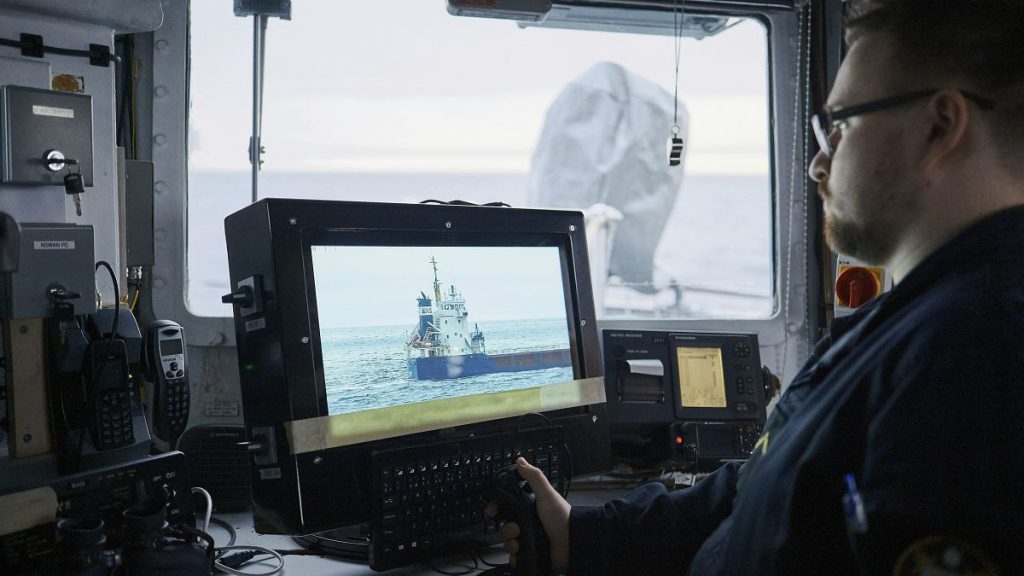Prime Minister Ulf Kristersson’s statement at a security conference encapsulates the current state of affairs for Sweden: a nation not actively engaged in war, yet far from experiencing true peace. This precarious balance is further underscored by Sweden’s commitment to bolstering NATO’s presence in the Baltic Sea, a region fraught with escalating tensions and suspected acts of sabotage against critical underwater infrastructure. This contribution marks a significant step for Sweden, representing its first deployment of armed forces under the NATO banner since joining the alliance in March 2023. This move reflects the gravity of the situation and Sweden’s commitment to collective security within the alliance.
Sweden’s contribution to the NATO effort comprises a multi-faceted approach involving naval, aerial, and coastal surveillance assets. Up to three warships will be deployed to enhance NATO’s maritime presence, accompanied by an ASC 890 surveillance aircraft to provide crucial aerial reconnaissance capabilities. Furthermore, the Swedish Coast Guard will contribute four ships dedicated to monitoring the Baltic Sea, with an additional seven vessels on standby, ready to respond to any emerging threats or incidents. This coordinated deployment highlights Sweden’s comprehensive commitment to safeguarding the region’s critical infrastructure.
The context for these heightened security measures lies in a series of concerning incidents in the Baltic Sea, particularly those targeting undersea cables and pipelines. These incidents have raised alarm bells, prompting investigations and increased vigilance by regional authorities and NATO. The suspicion of Russian involvement in some of these incidents adds another layer of complexity to the situation, further exacerbating tensions between Russia and the West, especially in light of Russia’s ongoing war in Ukraine.
One of the most prominent incidents was the damage to the Estlink-2 cable, a crucial energy link between Finland and Estonia. Occurring on Christmas Day, this incident raised suspicions of deliberate sabotage, with the Russia-linked oil tanker Eagle S identified as a potential culprit. The vessel, flagged in the Cook Islands but suspected of being part of Russia’s “shadow fleet,” is alleged to have dragged its anchor along the seabed, causing the damage. This incident highlights the vulnerability of critical infrastructure and the potential for disruption by actors operating outside of conventional norms. The Eagle S’s suspected connection to Russia and its involvement in circumventing sanctions imposed due to the war in Ukraine further complicates the situation, raising concerns about Russia’s intentions and tactics in the region.
Prior to the Estlink-2 incident, two separate data cables, one connecting Finland and Germany and the other linking Lithuania and Sweden, were severed in November. While the exact cause remains under investigation, German officials suspected sabotage, further contributing to the growing unease about the security of undersea infrastructure. These incidents, taken together, paint a picture of increasing vulnerability and the potential for disruption to critical communication and energy links. The lack of definitive attribution, however, adds to the uncertainty and underscores the challenge of responding effectively to such clandestine acts.
Perhaps the most impactful incident, and the one that significantly shifted the geopolitical landscape, was the sabotage of the Nord Stream pipelines in September 2022. These pipelines, crucial for supplying natural gas from Russia to Germany, were severely damaged by underwater explosions. While the perpetrators remain unidentified, the incident served as a stark reminder of the vulnerability of critical energy infrastructure and the potential for geopolitical tensions to spill over into acts of sabotage with far-reaching consequences. This incident highlighted the strategic importance of the Baltic Sea and the potential for disruption to energy supplies, further escalating tensions in the region. The attack on Nord Stream, coupled with the other incidents affecting undersea cables, underscores the need for enhanced security measures and international cooperation to protect critical infrastructure and ensure stability in the Baltic Sea region. Sweden’s contribution to NATO’s efforts in the Baltic Sea, therefore, comes at a critical juncture, demonstrating its commitment to collective defense and addressing the complex security challenges facing the region.














